
Each year, our members celebrate our union’s diversity on August 14. We encourage you to take this opportunity to find out more about the rich cultural mosaic that surrounds us in our workplaces and in our communities!

Each year, our members celebrate our union’s diversity on August 14. We encourage you to take this opportunity to find out more about the rich cultural mosaic that surrounds us in our workplaces and in our communities!

If you knew me at all, you would have never thought that I would be active in the union. When I started working I was young, naïve and not at all educated on the worker’s movement. All that I knew about it was that my parents were part of unions and they went on strike a handful of times.
BUT WHY?
Why choose to stop getting paid? It prevented us from taking that great trip down the Oregon Coast when I was eleven because the strike meant no spending money: no drives to the beach, no volleyball in the sand, no maple walnut flavoured ice cream cones. When I started working for the government, I figured I would stay away from union activity. Members get so angry and riled up; I didn’t see what the fuss was about. We have everything that we could want or need in our workplace. Little did I know that if we didn’t fight for what we have and more, it wouldn’t just be the one time I’d be missing out on the Oregon Coast, it could be many more times.
I was dragged to my first local annual general meeting in the Spring of 2009. I only went because I was social and wanted to attend with my friend – I thought maybe we’ll become closer friends after this. But I got involved – my first union event ever – and I was voted in as Treasurer. I joined the local for my own selfish reasons – I had just graduated University and I wanted to keep using my brain and perhaps this would fill up my resume a little bit more.
December 6, 2009. I turned 23 that day. I was one of three young workers at the National Component’s BC/Yukon Regional Conference. At the 2008 National Component Triennial Convention, a resolution was passed to have two young workers from each region attend the 2011 Triennial Convention and every one after that. There were only three of us: one wanted to go but didn’t think that she would be in the government much longer. Another wanted to go but only if she was extended because she was a term employee. Then there was me – I was thinking “what was I going to be doing that night for my 23rd birthday?”
I was an indeterminate, so my peers agreed it only made sense that I would get one of the seats. I remember heading home feeling awful. Here were two young women who wanted so badly to be involved in these events and they had graciously agreed that I should have one of the seats. In August 2011, I was the only of the three young workers to make it to the convention. I knew that I would have to be the voice for BC/Yukon young workers and bring the enthusiasm that the other two displayed in 2009. In a sense, I wanted to make them proud to have had confidence in me at convention.
Fast forward seven years… now I am the President of that same local and the 2nd Assistant Regional Vice President BC/Yukon for the Union of National Employees (UNE). A few things have changed since that 23 year old rookie at a union conference. I cannot believe that she and I are the same girl. Was I wrong about my preconceived notions about the union? Yes! Being active has taught me about so many important things about the worker’s movement and employee rights. Most importantly, we are not fighting for just ourselves but for all workers. I couldn’t be more proud to be part of – and active – in a labour union that has made so many strides forward in the right direction and continues to do so.
As a young worker and a young adult, I believe that we have a stronger voice than ever. Our more mature activists have extended their arms to help guide us in the right direction by sharing knowledge and advice. I am thankful and proud that UNE has been a pioneer in the young workers’ movement. At the 2011 Convention, our caucus consisted of 6 young workers. We were all new and unsure what to do with our time. Last year, our caucus consisted of over 30 young workers with an additional six of us as moderators. Young workers are notoriously shy when it comes to being active but UNE has made it so much easier to have our voices heard and help us grow as activists. Social media has also allowed the voice of the youth to be heard. It’s the new way of speaking up. Social media can allow a certain anonymity and this fosters individuals to voice their opinions and thoughts without fear of reprisal. I know now that we DON’T have everything that we could ever want in the workplace. We still have the working poor. We need to be their voices as well as our own.
This year marks the fourth year that the government has discussed and proposed an anti-union legislation, Bill C-377. Unions are already regulated and held accountable by the membership. Bill C-59 is a bill to ‘balance the budget’ by proposing changes to federal civil servants’ sick leave provisions. This Bill will not only negatively affect civil servants but it could also become the standard for both public and private sectors. We don’t want our gains to be taken away from us. So, thank you for making it an easy decision to stay active in the union. Thank you for inspiring me to get others involved in our message. Thank you for allowing us to stand tall and in solidarity towards one common goal.
Getting involved in the union was the last thing that I ever wanted to do, but I’m so glad that I did.
Daphne Ho is the UNE’s Assistant Regional Vice President for the BC & Yukon Region.
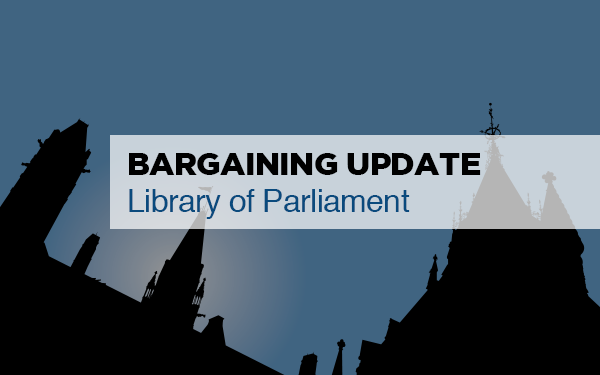
On Wednesday, August 5th our Bargaining Team for the AS and LT groups met with the Library of Parliament to commence negotiations for a new collective agreement. When presenting our package of proposals we told the Library that we are seeking new rights and protections for PSAC members at the Library in this round of bargaining, and that we are seeking improvements in a number of areas based on what our union has successfully negotiated with other federal employers.
Some of the improvements that we’ve proposed include increased leave provisions, enhanced job security and expanded union rights in the workplace. We also indicated to the employer that we will want to have discussion concerning hours of work and vacation scheduling when the parties next meet.
The Library proposed some very serious concessions in bargaining on Wednesday. These include the elimination of the job security provisions in our collective agreement as well as the elimination of all protections in the context of the introduction of technological change. The Library is also proposing to water down its obligations with respect to following the Public Service Health and Dental plans and the payment of associated premiums.
While we will meet our obligation to bargain in good faith with the employer, our objective in this round of bargaining is to achieve improvements for PSAC members at the Library of Parliament, not take steps backwards. We will also need to seek clarification on a number of the Library’s proposals when the parties next meet.
Also our Team has submitted a request for payroll and other financial information so that we may begin preparation on economic proposals this fall.
PSAC members at the Library should be aware that federal law prohibits unilateral changes to any terms and condition of employment subject to negotiation while the parties are in the process of bargaining a new contract.
If you have any questions, or are interested in seeing the proposals that we’ve tabled in bargaining, and those of management, contact a member of our Bargaining Team – Jean-Michel Lavergne, Caroline Dionne, Nadine Langevin or alternate Team Member Marcel Leonard.
The parties are next scheduled to meet in October. We’ll be sure to update as things progress.
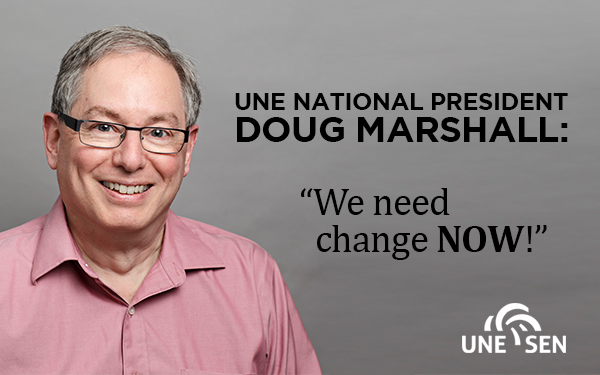
Sisters and Brothers,
I am writing to you, members of the UNE, now that Stephen Harper has officially called a federal election for October 19.
For all of us, this is the most important election in our lifetime. Never before has so much been at stake. Never before have we been faced with the end of the Canada that we have known.
Under a Harper majority government, over 5,000 UNE members have lost their jobs while thousands of others have had their pay cut because their hours of work were reduced. And what matters to all of us – the services we proudly provide to Canadians – have been slashed. At the same time, worker rights, human rights, union rights, and our very democracy have been under constant attack during the nine years of Harper rule.
We need to work together to stop Harper and instead elect a government that better represents the values we share. I urge you to get actively involved in this election; talk to your neighbours and friends, take part in your regional PSAC election activities, or work directly for a progressive candidate in your riding. Our future depends on it.
Doug Marshall
National President
Union of National Employees
*Connect with other UNE members on Facebook, Twitter and on our website at http://www.une-sen.org/
Help us spread our Vote To Stop The Cuts campaign message. Transform your profile pic now!
http://votetostopthecuts.ca/fb-photo/
Check out the full campaign here – http://votetostopthecuts.ca/
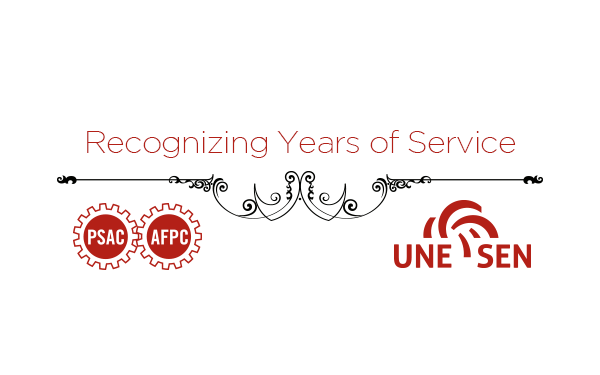
At the Union of National Employees, and at the Public Service Alliance of Canada, much of what we do would not be possible without the tireless work of our many volunteers. That is why I am proud to take this opportunity to extend a sincere thanks to those members who have made significant contributions through union activism.
The Public Service Alliance of Canada has a tradition of honouring long-term officers of the PSAC with service pins and certificates. These pins and certificates can be awarded to those with 10, 15, 20, 25, 30, 35 and 40 years of service.
If your Local wishes to nominate a member, please complete the application form and enclose a complete service history of the individual. Please pay careful attention when completing the period of service section of the form. The eligibility criteria and application forms can be found on the PSAC website.
Nominations must arrive at the UNE office no later than January 22, 2016.
In solidarity,
Doug Marshall
National President
Union of National Employees, PSAC
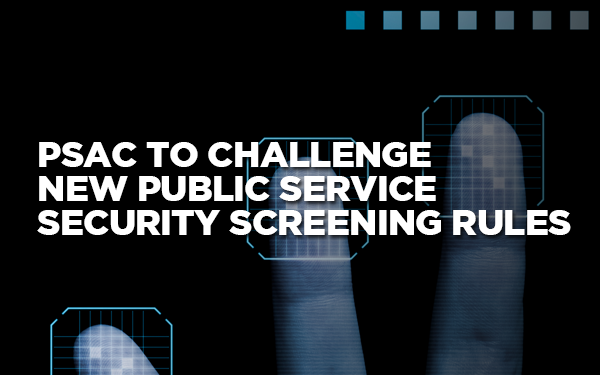
PSAC is opposed to the government’s new security screening policy — which includes credit checks and fingerprinting of public service employees — and will be challenging it.
We are currently gathering evidence to file a court challenge and a privacy complaint with the Privacy Commissioner’s office.
“We are concerned that these checks will be an unwarranted gross violation of personal privacy and they could put people’s livelihoods in jeopardy without cause. We are also fearful that the policy could be applied in an arbitrary way,” said PSAC President Robyn Benson.
What follows is a brief overview of this issue and how it impacts our members. More detailed information is available here.
The new policy, called the Standard on Security Screening, states that a valid security status or security clearance is a condition of employment, contract, appointment or assignment for all current and future potential federal public service workers. The policy took effect on October 20, 2014 and departments have 36 months to comply with it.
Enforcement of the new policy is planned to start this summer.
The new Standard applies to federal government departments and separate agencies (as identified in section 2 and Schedules IV and V of the Financial Administration Act). The new Standard replaces the Personnel Security Standard, created in 1994.
The policy applies to all new hires and current employees whose security status is renewed or changed, or who apply for an assignment or promotion.
The Standard creates three types of security screening:
Screening for each of these types is performed at either a standard or enhanced level:
Many of the requirements in the new security screening are an unnecessary invasion of the privacy rights of government workers.
For example:
Employees have a right to privacy. While there are some times when privacy rights have to be balanced with security needs, privacy must be protected unless there is a clear security reason. PSAC believes this policy goes way too far and most of the measures are not necessary to ensure security. The government has not shown any need for these new measures.
The new Standard violates the requirements of the Privacy Act and the protections for individual privacy protected by the Canadian Charter of Rights and Freedoms.
The new policy goes much further than previous policies and practices on security screening. While some employees who are in high security positions may have had to undergo security screening, this new policy applies to all employees. Employees, regardless of security status, will have to undergo fingerprinting and credit checks. This is unnecessary and goes too far. Credit checks can especially have a negative impact on members who are most vulnerable (e.g single moms, people with disabilities who have had to take long term sick leave). The policy doesn’t provide any details of what is considered “bad credit”.
Another new aspect of the policy is to require employees to report any changes in financial status or even about their personal lives (e.g. divorce). Members who fall on hard times will have the added worry that their job will be in jeopardy.
If this policy has had a negative impact on you, please contact your component for assistance. You may be able to file a grievance or access other recourse processes.
It is important to note that while PSAC is challenging the new Standard, it is currently in effect. Employees that do not abide by the Standard can have their assignment, employment or contract revoked or be terminated if they fail to get the required security clearance.
Therefore, we suggest that you follow the “obey now, grieve later” rule – this means that you should comply with the requirements, but if you want to challenge the Standard or how it is applied to you, you can contact your component representative to file a grievance.
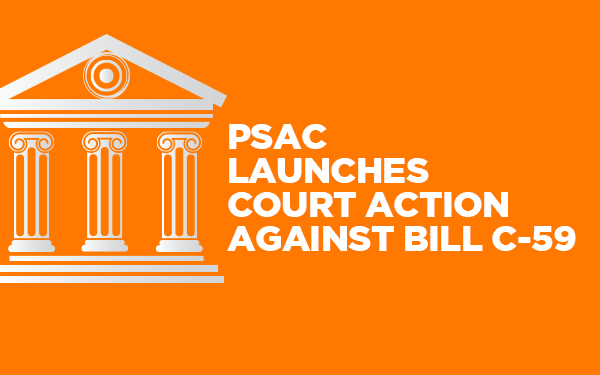
The PSAC filed its constitutional challenge to Bill C-59 in the Ontario Superior Court of Justice.
“The Supreme Court has confirmed that the right to collective bargaining is a protected right under the Charter – and we are defending that right through all legal means at our disposal,” said Robyn Benson, PSAC National President.
Bill C-59 gives the Conservative government the power to amend certain provisions in federal government collective agreements to remove sick leave and impose a short and long-term disability plan outside of collective agreements. The Bill will circumvent the Public Service Labour Relations Act as well as ongoing negotiations.
The PSAC is requesting the Court to immediately declare that Bill C-59 is in direct violation of our members’ Charter rights by:
More updates will follow as the case progresses.
Source: www.psacunion.ca

By Céline Ahodékon
Greetings Brothers and Sisters,
I hope your week is going well! Just a friendly reminder that Saturday, June 27 is Canadian Multiculturalism Day. In fact, Canada was built and continues to be built upon immigration. Each year, thousands of immigrants from around the globe land in Canada in search of a better life for themselves and their families. They bring with them their beliefs, religions and cultures. In turn, these traditions enrich the mosaic of Canadian society.
June 27 is for us a special day to recognize our country’s rich diversity as well as the important contributions ethnocultural communities make to the development of our homes, our neighbourhoods and our workplaces.
Céline Ahodékon is the Union of National Employees’ National Equity Representative for Racially Visible People.
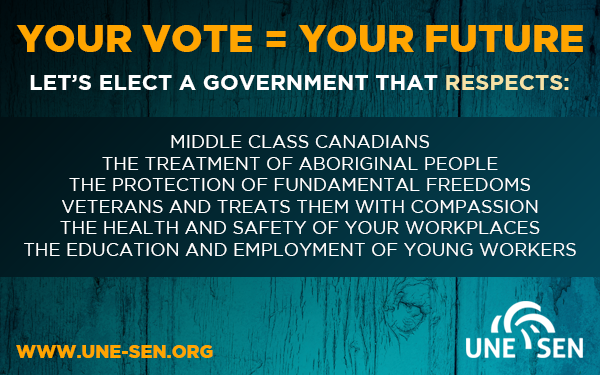
As the October 19th election approaches, the Union of National Employees urges all Canadians to think about the lack of respect this government has increasingly displayed over the last 10 years. If the last three terms have taught us anything, it is that there is no end in sight if the Harper government remains in power following the next election.
“It comes down to respect,” said UNE National President Doug Marshall. “As a union we ask for respect at the bargaining table and in the workplace. As Canadians we demand respect for our families and livelihoods. All of this has been under attack under the Harper regime.”
The cuts to services affect us all. Government jobs have been slashed and privatized, leading to lower wages and reduced employment stability. And the cuts are twofold – not only do they impact the workers but also leave Canadians with poorer access to quality services; environmental protection and the preservation of historic sites have been compromised, the number of officers who protect the health and safety of workers is dwindling, and wait times for virtually all government services have increased. Just try to get a security clearance these days. You might have several job offers, but the government is months behind in processing clearances. The result? Capable workers are left to draw on employment insurance.
It’s a direct attack on middle-class Canadians. Hard-working families have been ignored and abandoned. The Canadian dream of working hard and getting ahead is no longer the norm as Canadians struggle under crippling debt.
So we urge you to get out and vote on October 19th. Over the next few months we will provide you with the steps you need to take to ensure you are on the voter’s list and that your voice is heard loud and clear. You have the power!
We recently had the opportunity to participate in Mediaplanet Canada’s Organized Labour campaign which provides an opportunity to educate Canadians on the importance of Unions. The Organized Labour campaign is the perfect opportunity to celebrate the men and women who fought and continue to fight for the rights and freedoms of hardworking Canadians as well as many additional rights we enjoy as union and non-union members today. The campaign was distributed through the Toronto Star on July 18th 2015 and is published online. For the full campaign, click here: http://bit.ly/1JUJ9Y9